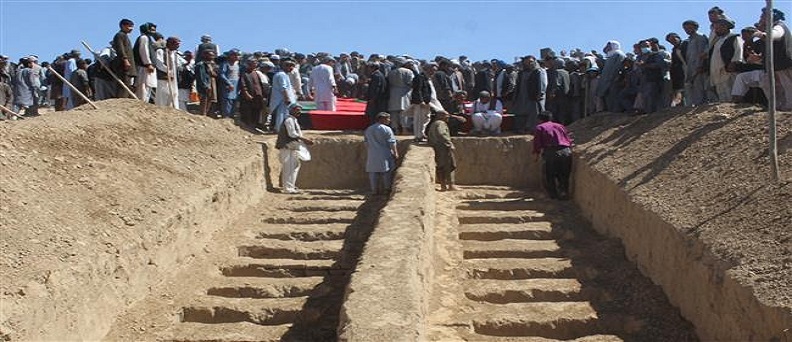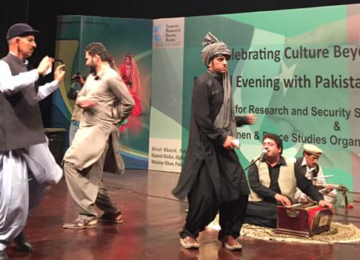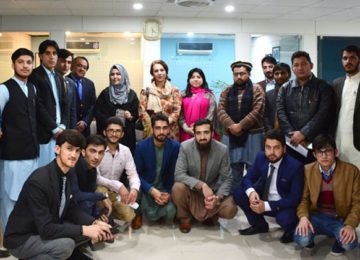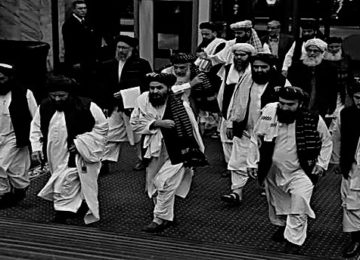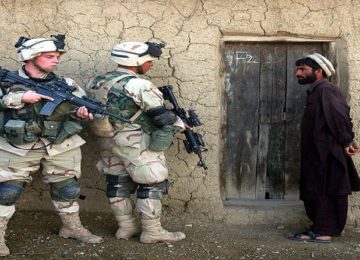By Tahir Khan
The UN Assistance Mission in Afghanistan (UNAMA) has confirmed allegations that “Taliban and local self-proclaimed Islamic State / Daesh fighters killed at least 36 people, including civilians and person hors de combat (A French term meaning “outside the fight”), in northern Sari Pul province earlier in August. The UNAMA on Sunday released initial findings of its human rights fact-finding mission into early August attacks on Mirza Olang village in Sayyad district of Sari Pul.
“At least half of the killings took place on Saturday 5 August when Anti-Government Elements stopped families trying to escape the village, separated women and young children, and killed at least 18 people, both civilians and Pro-Government Militia who were hors de combat at the time of their killing. Others, including one woman, were reportedly shot while they tried to escape from the village,” the report said.
Afghan officials had earlier blamed the Taliban and a local Daesh commander, Sher Mohammed Ghazanfar, for the killings. Daesh had claimed responsibility while the Taliban said they were not involved. Tolo TV quoted residents of the valley as saying that they saw “white and black flags” with the attackers. These witness accounts confirmed the joint operation as Taliban carry a white flag, whereas Daesh carry a black flag.
When I enquired from Zabiullah Mujahid, the Taliban spokesperson, regarding the attack, he not only denied the Taliban’s alliance with Daesh – citing both the groups were arch-rivals – but also contradicted Afghan official civilian casualty figures. “Joint attack with Daesh is impossible,” Mujahid insisted when asked whether the Afghan government and witness accounts were correct. The Taliban spokesperson, however, said 28 ‘Arbakis’ or local militia were killed in the fighting, who were buried by the locals. “There is a possibility of the killing of seven civilians including a woman and 3 children in the fighting but no one had been involved in intentional killing,” Mujahid told me.
The Taliban denial of involvement in civilian deaths is now a routine and many in Afghanistan and international organizations including the UN do not believe their claims. The most important is the allegation of the Taliban-Daesh cooperation to kill mostly Shia Hazaras in Mirza Olang village. Daesh would have no regret to kill Shiites either in Afghanistan or any part of the world, but the killings in Mirza Olang are a serious blow to the Taliban’s already tarnished image across Afghanistan. Also, Mujahid’s denial regarding the incident was also vague. There could also be the possibility of local level cooperation between the Taliban and Daesh commanders in northern Afghanistan to give tough time to the government forces.
Taliban are currently involved in fighting with the Afghan security forces in parts of northern Afghanistan to overrun areas as part of their strategy to increase influence in the non-Pashtun areas. So a possibility of Taliban-Daesh cooperation at local level cannot be ruled out. On August 21, Afghan media reported that the Taliban captured KhamAab District of northern Jowzjan Province and that the Taliban also laid siege of Aqcha District that enabled the insurgents to control strategic places of this province. This district is the stronghold of General Abdul Rashid Dostam, the first vice-president of Afghanistan.
President Ashraf Ghani is believed to have forced Gen. Dostam to leave the country because of internal differences within the National Unity Government. Dostam, currently living in Turkey, left the country after being accused of sexually harassing his arch-rival, Ahmad Eshchi, the former governor of General of Jowzjan. Dostam had refused to surrender his guards involved in the crime against Eshchi, despite arrest orders by the Attorney General’s office. This incident also points towards the powers of influential individuals to resist the country’s law due to their position in the government or the state. Additionally, an aircraft, carrying Dostam, was not allowed to land at Mazar-e-Sharif airport last month. This internal rift also encouraged the Taliban to step-up their attacks against the Afghan security forces.
A worrying sign for the country is the Taliban having expanded their scope of attacks at a time when efforts for political negotiations are completely halted. Taliban leaders have conveyed to Pakistan that they are in no mood to join the intra-Afghan dialogue at least for now as they believe having an upper hand in the war. All eyes are now on President Trump’s new Afghan strategy, as Afghans are anticipating whether he would persist with the same strategy or call for a political dialogue and negotiated settlement.
For the purpose of some sort of a negotiated settlement, the Afghan government had earlier tried to reach out to a breakaway faction of the Taliban, under Mullah Mohammad Rasool. However, the Rasool faction lost its importance after its chief was detained in Pakistan in March 2016. Soon after that, some of Rasool’s followers re-joined the Taliban under Maulvi Haibtullah while others, including Abdul Manan Niazi, are now reportedly living somewhere around Kabul. Rasool is still in Pakistan’s custody, according to the Taliban officials familiar with his arrest. The dissident faction had faced a serious blow when Mullah Baz Mohammad, who served as a deputy to Mullah Rasool, re-joined the Taliban under Haibatullah.
Some Afghan journalists had earlier reported that Abdul Manan Niazi was now accessible to the media, meaning that he was based in Afghanistan under the protection and with consent of Afghanistan’s security agencies. There were also reports that another senior leader of the dissident group, Mullah Nangialai, had also fled his stronghold of Herat province after fighting with the main Taliban faction and is now living somewhere outside Herat under the government’s protection.
This situation, with the dissident groups failing to gain momentum and the Taliban stepping up their attacks, coupled with Daesh’s rise in Afghanistan is an ominous sign for the domestic and foreign security forces. It would take serious and concerted political efforts, including all stakeholders, to reach a negotiated settlement, ensuring long term peace, for the war torn country.
The author is editor NNI news agency, and also a member of CRSS’s Track II Diplomacy initiative, Beyond Boundaries, with Afghanistan.
Copyright: Center for Research and Security Studies (CRSS) and Afghan Studies Center (ASC), Islamabad.



